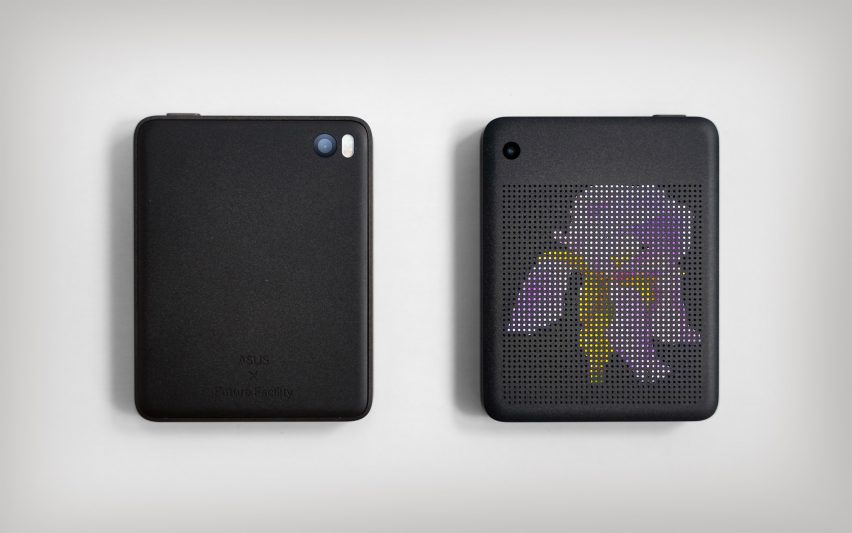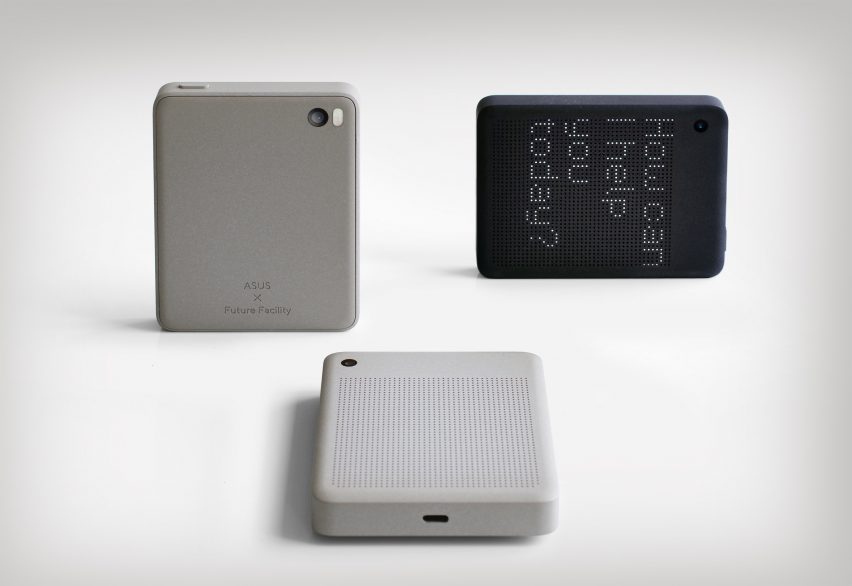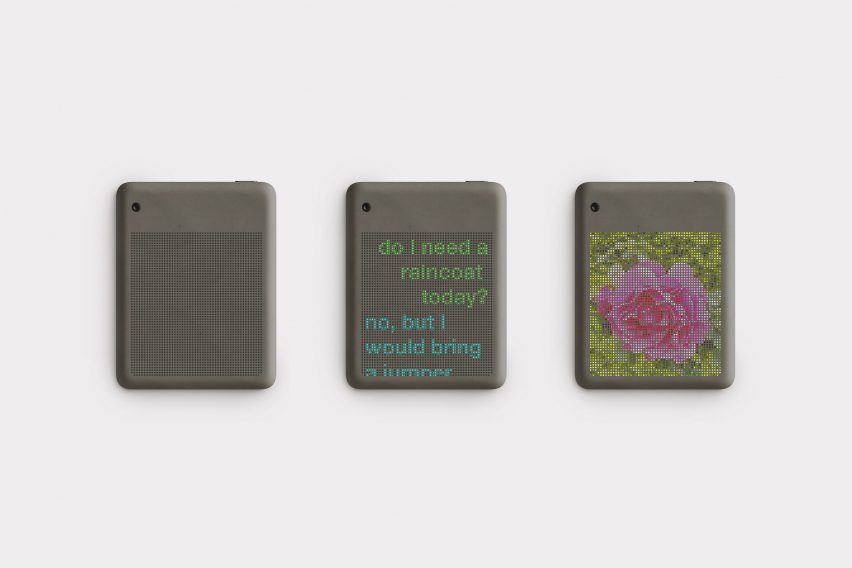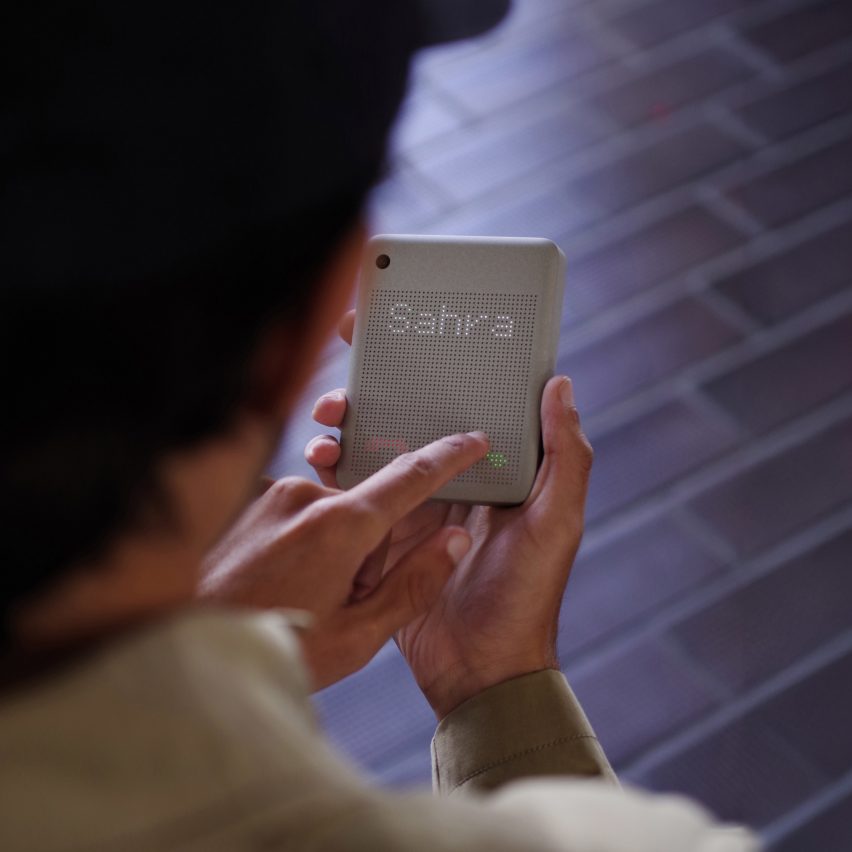Future Facility uses Ceraluminum to create AI device that aims to "bring about calmness"
Future Facility has created a conceptual artificial intelligence device that aims to provide a "calmer" relationship with technology for ASUS Zenbook and Dezeen's Design You Can Feel exhibition, which opens tomorrow at London Design Festival.
Called SUSA, the small conceptual electronic device can perform many of the functions of a smartphone, tablet or portable computer.
However, it deliberately suppresses intrusive entertainment and social media by placing its screen behind a tactile perforated surface.
By doing so, London studio Future Facility – which is a research-focussed offshoot of the design studio Industrial Facility run by Sam Hecht and Kim Colin and led by Leo Leitner – aims to shift the user's attention away from the screen and toward the physical object itself, to create an example of what the designers call "calm technology".

The case of the device is crafted entirely from Ceraluminum, a proprietary material developed by technology company ASUS for its Zenbook laptops, which merges the lightness of aluminium with the durability of ceramics.
ASUS has invested years into fine-tuning Ceraluminum, which is created by treating aluminium in a process similar to anodisation, but which eliminates volatile organic compounds (VOCs) and heavy metals and results in a 100-per-cent-recyclable material.
SUSA is an AI-powered conceptual device
Via a carefully controlled combination of electric current, voltage and mineral formula – with no added pigments – the process transforms the surface of the aluminium into a smooth, matt finish that is warm to the touch and offers increased scratch resistance and durability.
Subtle variations in the patina on the material's surface make each object crafted from the material unique.
"These material qualities bring about a calmness that is less stimulating than glass or anodised surfaces," Colin said. "We wanted to harness this aspect into the presentation of the technology itself."
"We see the potential for Ceraluminum to be more than just a CMF [colour, material, finish] choice," Hecht added. "It resonates with us because it has a fine tactile quality that is only possible with aluminium."

Rather than using a touchscreen to operate the device, the user would use voice commands, which the advanced artificial intelligence (AI) software would be able to interpret based on the context.
Users can still take photographs, watch video content or play games on the device but these would appear in lower resolution via the perforations on the front of the device. In contrast, digital assistant tasks and other audio-related functions would become the focal point and remain high-resolution.
"For handheld mobile devices, we find ourselves at a new juncture, where the most powerful element is no longer its camera resolution, OLED display, or memory capacity, but its power to communicate using artificial intelligence," said Colin.

By minimising the emphasis on visual interaction, SUSA aims to suggest how AI could be used to shift how we interact with certain digital devices to create a more intuitive, tactile and less distracting experience.
To enhance the tactile experience of using the device, SUSA features advanced haptic feedback.
"We combined Ceraluminium, OLED and Sensel haptic touchpad technology to activate the Ceraluminium perforated surface through touch," said Leo Leitner.

Dezeen commissioned Future Facility to create SUSA as part of the Design You Can Feel exhibition it has curated for ASUS Zenbook.
Running from 17 to 22 September, the exhibition investigates materiality, craftsmanship and AI, demonstrating how form, texture and colour can evoke sensory responses through crafted objects.
SUSA will be presented alongside works by other leading designers including Fernando Laposse, Giles Miller, Natural Material Studio and Studio Furthermore, who will present work that speaks to the distinct qualities of Ceraluminum.
In addition to SUSA, the exhibition will feature an aluminium lounge chair by Seoul-based design studio Niceworkshop, which has also undergone the ceramisation process. These projects mark the first time Ceraluminum has been applied to objects other than the ASUS Zenbook.
Future Facility is a technology outgrowth of Hecht and Colin's influential London design studio Industrial Facility.
Now under the direction of Leitner, the studio specialises in creating intelligent, user-centred designs that explore the convergence of physical, digital and experiential forms.
Through research, invention and prototyping, Future Facility seeks to develop products and services that remove friction between people and technology, aiming for intuitive and empathetic design solutions.
Design You Can Feel takes place during LDF
Design You Can Feel will run from 17 to 22 September at Protein Studios in Shoreditch during London Design Festival. Find out more information including opening times at: dezeen.com/designyoucanfeel.
London Design Festival 2024
London Design Festival 2024 takes place from 16-22 September 2024. See our London Design Festival 2024 guide on Dezeen Events Guide for information about the many other exhibitions, installations and talks taking place throughout the week.
Partnership content
The Design You Can Feel exhibition is a partnership between Dezeen and ASUS Zenbook. Find out more about Dezeen partnership content here.